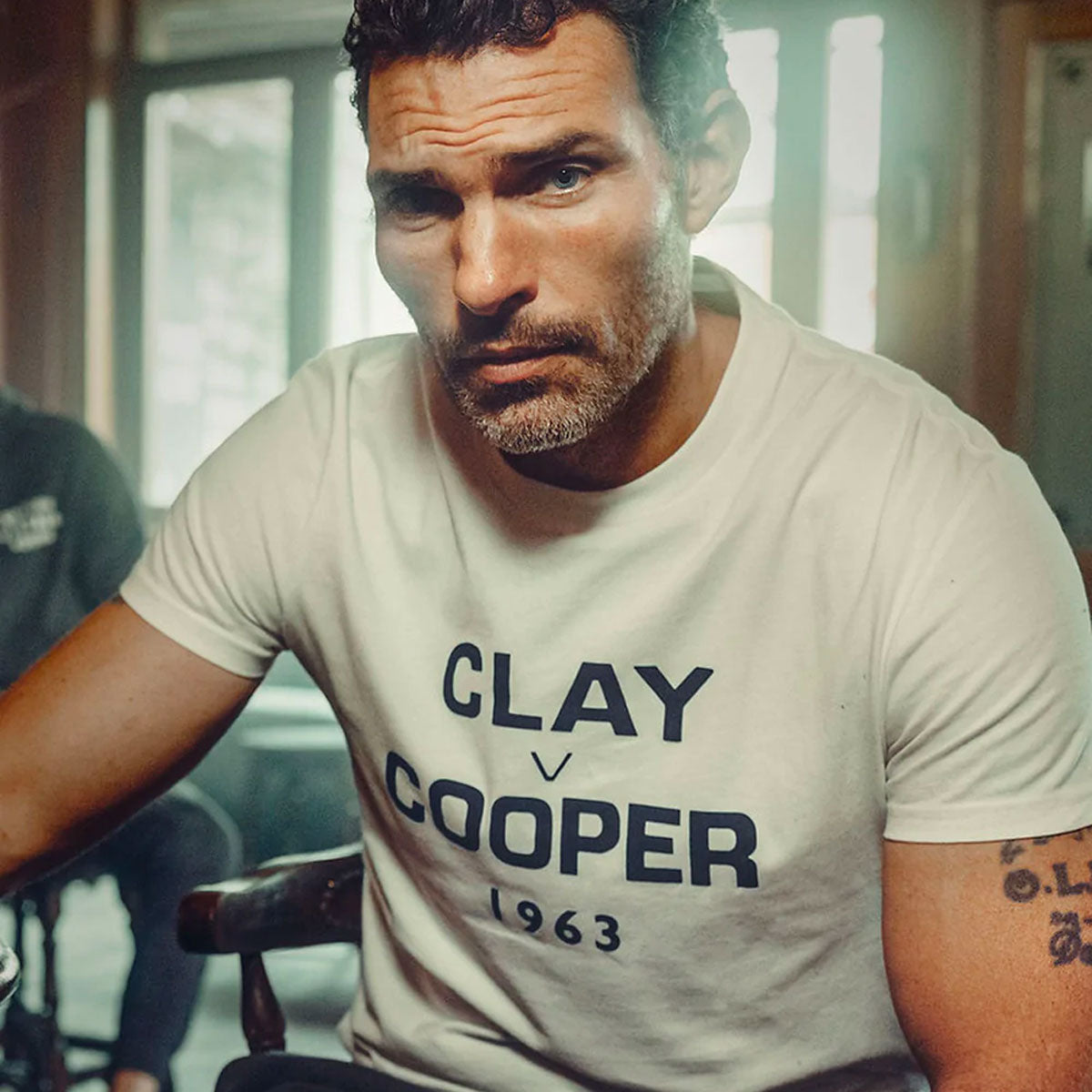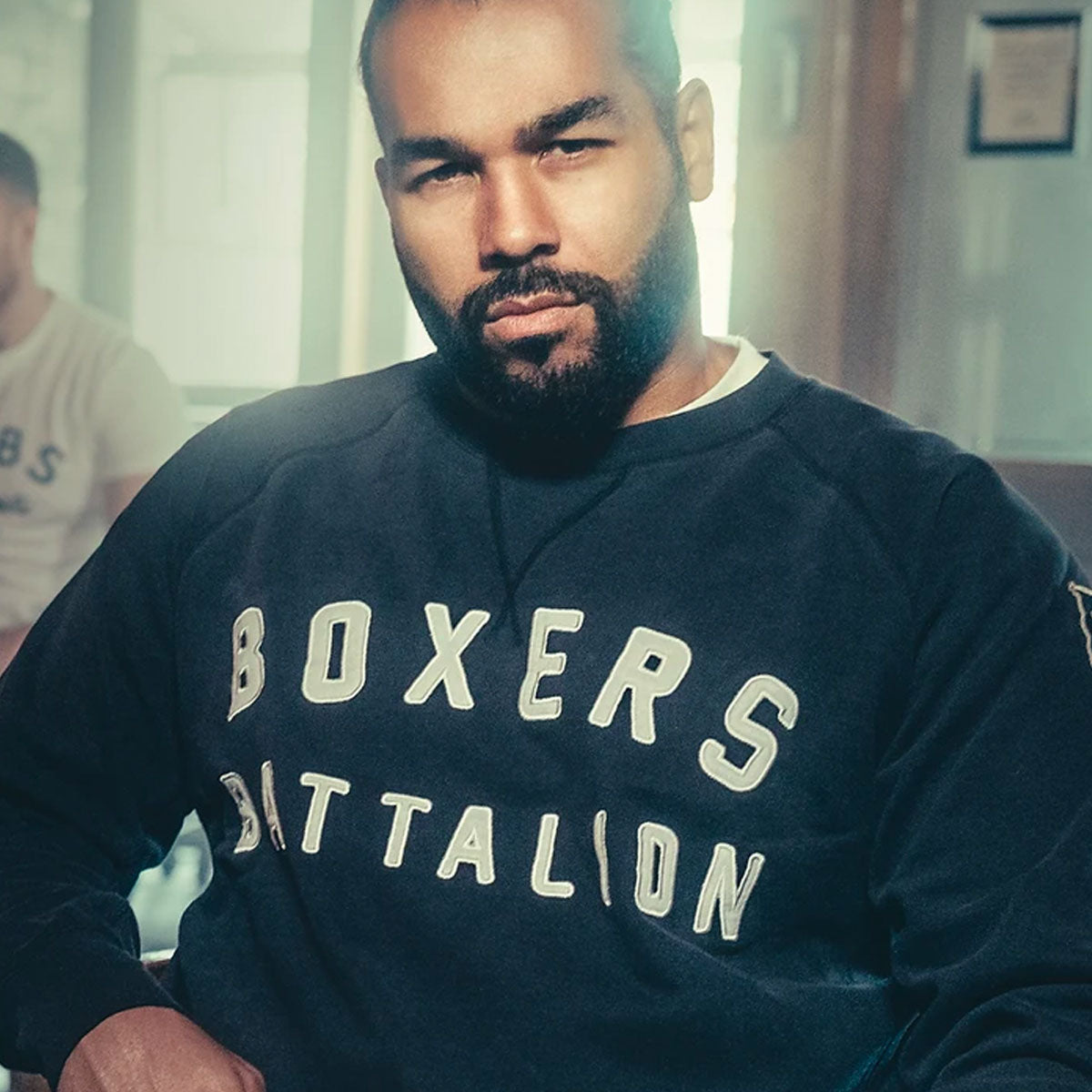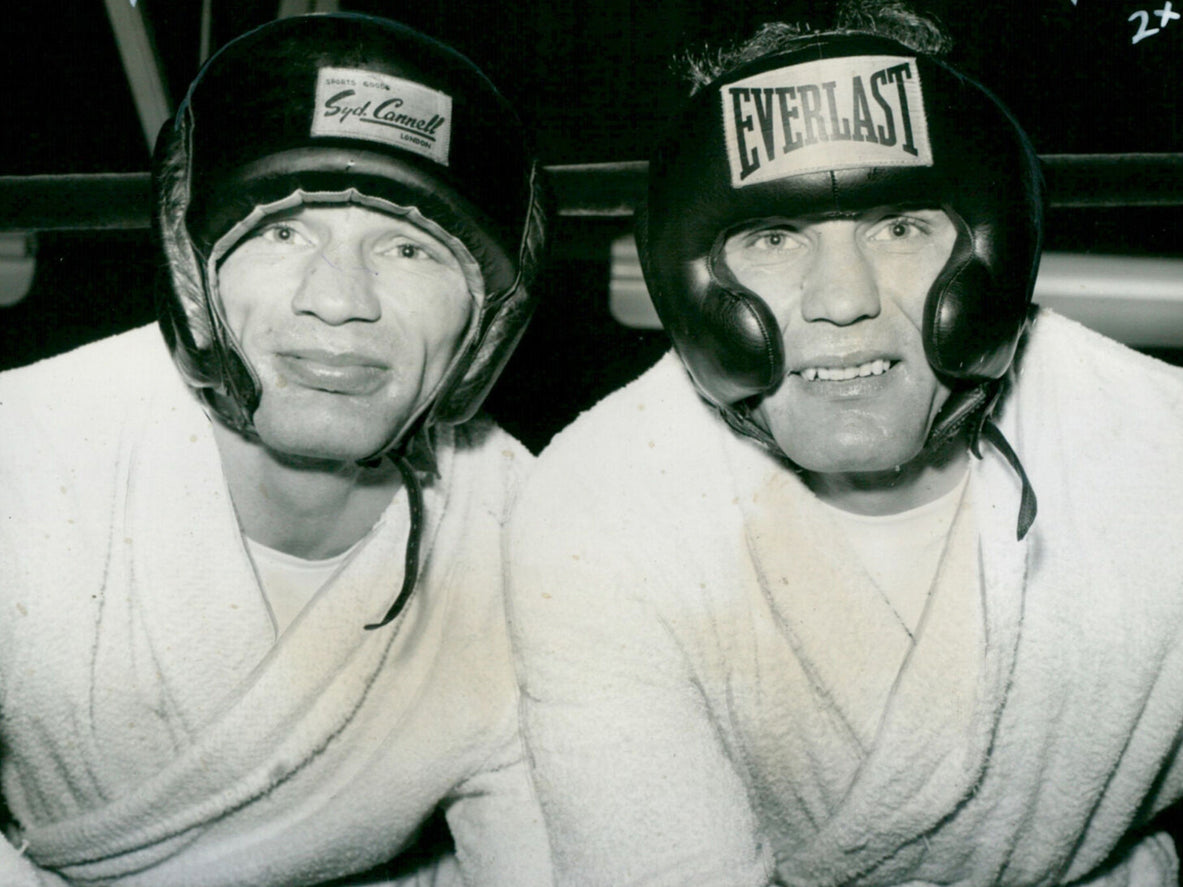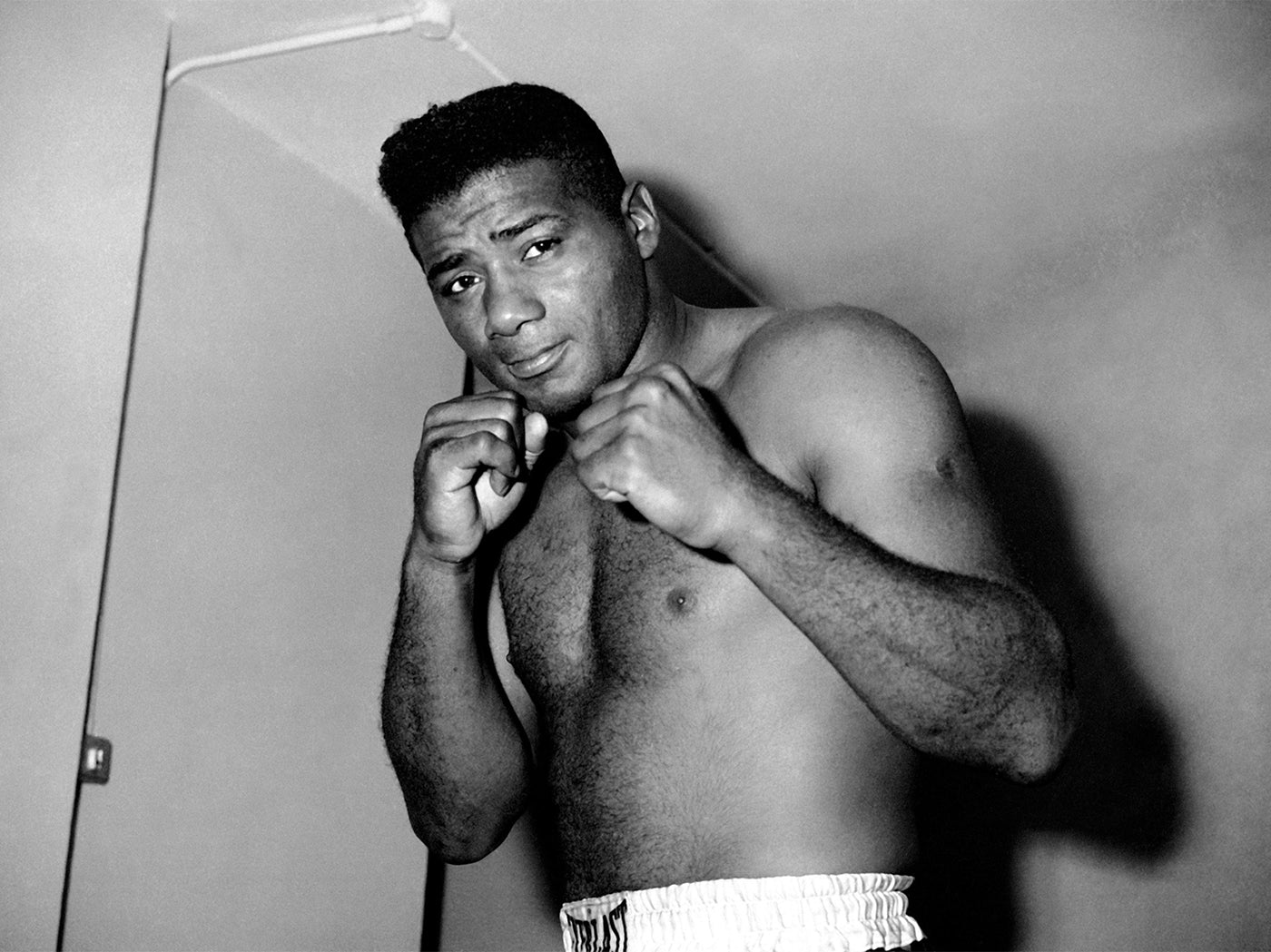‘We went to school together, we went boxing together, we were together in the Army. We look alike, we think alike, in temperament we’re similar and often we catch ourselves repeating each other’s remarks.’
Henry Cooper
Born on 3 May 1934 in Lambeth to parents Henry (Sr) and Lily, George Cooper was born 20 minutes after his identical twin and sporting icon, Henry. Our Enry recalled in an interview with The Guardian, ‘We were born ... which was the biggest surprise of my mother's life. Not wanting to see the x-rays beforehand, she was going to call us Walter. Then one of the nurses took a peep at us and said, 'They're a proper little Henry and George. They're going to be six-footers.' And that's how it stuck.’

Alongside older brother, Bern, the family moved from Elephant and Castle to 120 Farmstead Road, Bellingham in 1940, where you can still see a plaque commemorating their residence. Shortly after moving into the Bellinhgam property, the house was badly damaged by a German bomb and the family relocated to West Sussex, then Gloucester over the next 12 months. While this was happening, their father was overseas in India for three years as part of the World War Two effort, engaging in active warfare.
Henry Sr, had served in the army soon after World War One and became an accomplished amateur boxer for the Royal Horse Artillery regiment. However, it was actually a neighbour, Bob Hill who encouraged the twins to box after spotting them having a play fight in the street. Hill introduced George and Henry to Bellingham Amateur Boxing Club (ABC), which was in the British Legion hall on their estate, where they were tutored under the expert eyes of founder, Albert Colley. The head trainer also got them jobs as plasterers, which helped with their upper body strength, in addition to contributing to their keep. Despite losing their first four fights, they both made their mark as amateurs, with Henry going on to win the ABA light heavyweight title at 18 years old, which then gave him the platform to compete at the 1952 Olympics in Helsinki.
After leaving school in 1949 at 15 years old, they progressed to Eltham ABC, where George now had the reputation of being the harder and more vicious puncher of the pair. Unfortunately, at the age of 16, George suffered badly from rheumatic fever, which took him away from boxing for 12 months, then in 1953, about a year before turning professional, George broke his thumb and it is believed that this affected his punch power and technique for the balance of his career.

Before turning pro, the twins proudly completed their military service, which was made easier due to their pugilistic prowess. The Ministry of Defence recalled. ‘Like any national serviceman good at sport, the Cooper brothers had their pick of the regiments, all tantalised by the prospect of recruiting a budding boxing champion. (Ironically, George not Henry caught the eye of the Scots Guards).

And as familiar faces on the boxing circuit, the brothers regularly fought for money in London, where they met Captain Eastlake who ran the boxing team of 4 Battalion, Royal Army Ordnance Corps, known as the ‘Boxers’ Battalion’. Henry recalled being told:
‘Oh, you don’t want to go in the Guards. You’ll have to do all that square-bashing and all that guard duty’, adding, ‘but if you come with us, you’ll get time off for training’.’
At the time of turning pro, there was a number of boxers by the name of George Cooper and consequently George fought under the name of Jim Cooper to avoid any confusion. Albeit, he was often introduced to the ring as ‘Twin George.’ Both George and Henry made their debut on 14 September 1954 at the Harringay Arena, London and despite Henry’s first round stoppage victory, it was George’s points win against fellow debutant, Dick Richardson, which was greater merited, especially after coming off the canvas twice in the opening round. Dick went on to become European heavyweight champion, picking up some impressive scalps along the way, including, Ezzard Charles, Karl Mildenberger and Brian London, but unfortunately for George, seven months after their first encounter, Dick stopped George in the second round due to a badly cut eye. Although Henry was known to be a profuse bleeder, George was far more susceptible to cuts.

In George’s next 12 fights he won five and lost seven, which included avenging a 55 second stoppage he had endured in his third outing against Bob Gardner, this time beating him on points. George also had a notable loss against future British and Commonwealth champion, Brian London. Due to the severity and quantity of cuts sustained around his eyes, George didn’t fight from September 1957 until April 1959.
Going into his seventeenth outing, George took on French heavyweight champion, Francis Magnetto on 5 July 1960 at the Empire Pool, Wembley. Despite giving away just under 6lbs and having a negative record of seven victories and nine losses to his name, George took care of business in two rounds. Unfortunately, three months later, George travelled to Bologna, Italy and was stopped in the seventh stanza by the Emilian Bull, former heavyweight European champion Franco Cavicchi.

Five months later, Twin George beat Jim Whittaker twice in the space of eight weeks, before coming up against highly touted Chic Calderwood on 9 August 1961 at Kelvin Hall, Glasgow. George was without a doubt the heavy underdog, fighting in Calderwood’s backyard, giving away a couple of inches of height and reach advantage, not to mention Chic was a vicious puncher who boasted a 30-1 record and held the light heavyweight Commonwealth and British titles.
Despite the odds being stacked against him, George gave a good account of himself and fought 10 hard rounds to a draw. Calderwood fought a further 22 fights over the next five years, before passing away prematurely in a car accident in November 1966.
Jim Cooper won six of his next 10 outings, with notable victories against Johnny Prescott and Ray Shiel, before hanging his gloves up ahead of time at the end of 1964 due to his incessant injuries. His record reads 16 wins, 14 losses and one draw, and at one point was rated No.5 in the UK’s top heavyweights. Despite not fulfilling his promise as a boxer, George’s contribution to Our Enry’s success was immeasurable. At the age of 30, George became a vital component of his brother’s team for the balance of his career as co-trainer and confidant. If you take a look at Henry’s most prolific battles, such as his fights against Muhammad Ali and Joe Bugner, you’ll see George in the corner alongside Henry’s manager Jim Wicks.

George, Jim or Twin George – either way, the brother of Henry was most certainly an underrated heavyweight boxer and minus his vulnerability to cuts, he may well have fought his way to domestic titles. George passed away on 11 April 2010 aged 75, 13 months before twin Henry. Just to think there might have only been Walter…..
Paul Zanon, has had nine books published, with almost all of them reaching the No1 Bestselling spot in their respective categories on Amazon. He has co-hosted boxing shows on Talk Sport, been a pundit on London Live, Boxnation and has contributed to a number of boxing publications, including, Boxing Monthly, The Ring, Daily Sport, Boxing News, Boxing Social, amongst other publications.

